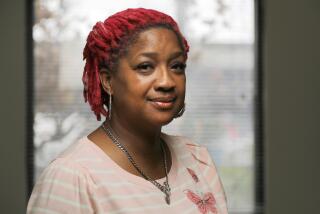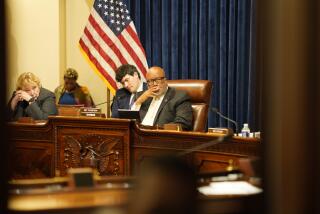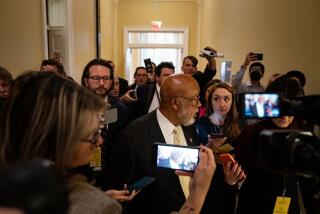White House Civil Liberties Panel Finally Meets After 16 Months
WASHINGTON â A White House civil liberties panel created more than a year ago to monitor the effects on ordinary citizens of the war on terrorism took its first significant action this week.
It met.
The panelâs five members heard from the administrationâs point man on the National Security Agencyâs warrantless surveillance program and got a briefing on the Patriot Act from the Justice Department.
The organizational session, held Tuesday at the White House, left the lone Democrat on the panel cautiously optimistic that the board might eventually be an effective watchdog.
The board reports to President Bush, who also appointed its members. It was created by intelligence-reform legislation signed in December 2004.
Formally known as the Privacy and Civil Liberties Oversight Board, it was conceived by Congress as a check on government power, although it has had a slow start in part because Bush took months to send its nominees to the Senate for confirmation.
The bipartisan commission that investigated the Sept. 11 attacks said the inaction reflected indifference by the administration toward civil liberties, even as the White House had aggressively extended executive power to protect the country from suspected terrorists.
The panelâs chairman, Carol E. Dinkins, a Houston lawyer, said in an interview Wednesday that members were taking their mandate seriously and were beginning to reach out to groups like the American Civil Liberties Union, as well as to members of Congress and federal agencies, to develop an agenda.
âWe think it is very important to get input from people really immersed in these things to see what should warrant our immediate attention,â Dinkins said.
Besides advising Bush, the board is required to report annually to Congress on its activities. Dinkins, a former Justice Department official in the Reagan administration and a longtime political ally of the Bush family, also said that some meetings would be open to the public.
The one Democrat on the panel said the meeting surprised him.
âWe were treated with great seriousness by the White House and by the intelligence community,â said Lanny J. Davis, a Washington lawyer who has known Bush since college. âA lot of my Democratic friends assumed ... we were really not going to be able to do very much.â
On Tuesday, panel members heard from Air Force Gen. Michael V. Hayden, deputy director of national intelligence and the former director of the NSA, who briefed them on the domestic surveillance program. They are obtaining high-level security clearances so they can review classified information about the NSA and other government anti-terrorism initiatives.
More to Read
Sign up for Essential California
The most important California stories and recommendations in your inbox every morning.
You may occasionally receive promotional content from the Los Angeles Times.










